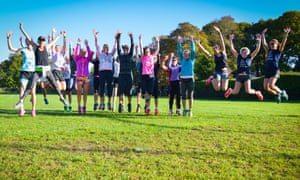England Athletics #runandtalk campaign – supported by the charity Mind – has given an opportunity for their mental health ambassadors (MHAs) to offer local sessions where anyone can come and give running a try. Bring together the great outdoors, the enthusiasm and experience of the MHAs, plus the expertise of run leaders and coaches, and trying out exercise becomes less intimidating, more welcoming, even – dare I say it – fun.
I’m living proof of the inextricable link between running and positive mental health. Amid the turmoil of a complicated divorce, I set up a morning run group. I wanted to offer support to single mums like me, who could only run when their children were at school. As I went in and out of the school playground, every day, for years, so many of them would share their life issues. We all needed an outlet.
Looking after my three girls on my own, while going through divorce, left me with severe anxiety. I didn’t really want the responsibility of looking after any more people, but being at home only encouraged my pinching voice of self-doubt to get louder. I needed the group as much as they needed a coach. Even though there were evening sessions every day of the week at local clubs, they were useless to parents without childcare. I also signed up to be an MHA the day the scheme was launched.
My group forced me to leave my house when I wanted to hide away. As I ran between each member, they would share their daily battles with me. While we ran, we supported each other. Any of the runners could have gone to a regular club speed session. I wanted our speed sessions to include mindfulness and gratitude. Soon it wasn’t just a small group of mums, but diverse in background, ability and talent. Men came, too!
During my early running years, I had to work hard just to hold on to the back of a navy field gun crew from the local submarine base. Those men didn’t chat, moan, confide or confess when they ran. They were tough, and led by the toughest runner I have ever known: my dad. He could down a bottle of vodka on Saturday night, then run a sub-three-hour marathon Sunday morning; he epitomised the military protocol of work hard, play harder. My group would not be like his.
Going along to any running session is hard enough. When your coach asks you to lie on the ground, hands against the earth, connect to the universal energy and positively focus on that moment only … it’s unconventional. Given time, though, runners relax, giggles subside and they realise how vital the mind is to be the best runner you can. Clearing your mind from daily stresses and worries can give as much benefit as any pyramid or hill session.
All our runners come along and support #runandtalk, including Laura, the worker in the group. Not only does she do an amazing job raising her six children alone (including two sets of twins), she runs a thriving business. Forcing a run group into her hectic schedule is a lifesaver. “If I didn’t have this chance to burn off my stress and talk about my worries I would be a terrible mother,” she says. “This one hour, together with my daily practices of gratitude and mindfulness, gives me freedom and focus in a very busy life.”
Sandra, who was at my very first session, is the matriarch of the group. At the tender age of 70, she is world champion in her age group at Olympic distance triathlon. She has been running for 50 years. “Any group can only thrive on give-and-take; sharing skills and experiences. Being a part of a group can be powerful. You get friendship, fun and challenge, whatever your ability.”
Susan is our smiler. On her journey to fitness, during which she has lost more than 32kg , and her 5K personal best from 46 to 29mins, she remains eternally happy to have found a new family. “I never knew I was a runner!” she says. “But it’s my hour of sanctuary, away from work and looking after my three kids. The range of abilities may be vast, but there’s always encouragement when you’re finding it tough, or a cheer when something new is achieved.”

Without the group, and our #runandtalk sessions, I wouldn’t have coped with a dark chapter of my life. Running, however hard it feels at the time, gives you strength and self-belief, a theme in my new book, which has six easy steps on how to introduce exercise, and running, into your life to help you cope with difficult emotions.
Running helps you focus forwards. Ours is one tiny group in a nation of runners, but the support we give each other is more powerful than any antidepressant. Imagine how happy this small island would be if we could get the whole nation to #runandtalk?
Tina Chantrey is a running coach and contributing editor of Women’s Running magazine. Her latest book is The Divorce Survival Guide: How Running Turned My Life Around. You can follow her on Instagram @shewhodaresruns
Source: Read Full Article
